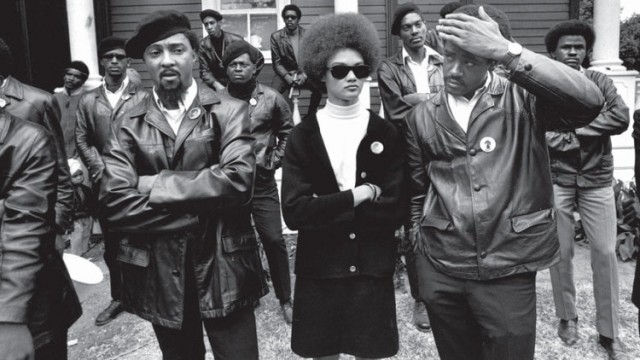The Black Panther Party was formed in 1966, 50 years ago this October. At the time, the black community was facing poverty, underemployment, police harassment, incarceration, and political exclusion. Not much has changed. Stanley Nelson, Jr.’s new PBS-produced documentary, The Black Panthers: Vanguard of the Revolution, doesn’t explicitly draw parallels between 1966 and 2016 nor does he ever mention Black Lives Matter nor any of the other modern movements, but he sure makes the dots easy to connect.
When I was in high school, I vaguely remember images of the Black Panther Party passing across our textbooks in discussions of the Civil Rights movement of the 1960s. They were but a footnote in the already small section dominated by Martin Luther King, Jr and Malcolm X. What I remember was the militant imagery of the Black Panthers, openly carrying guns with bullets strapped to their chests. I don’t even remember learning about Huey Newton until reading his name in The Boondocks. The Black Panthers weren’t demonized, they were just an example of the extremity of the Civil Rights movement; a mirror image to the image of fire hoses in Montgomery. Some might not have even gotten that. PBS’ new documentary, Vanguard of the Revolution, fills in the story of this highly visible civil rights group in the North and West, how it rose to prominence and how it fell to Earth.
Originally formed as a socialist community program, The Black Panther Party initially focused on community organization. To combat the effects of poverty The Panthers instituted several social programs, including the highly visible Free Breakfast for Children program and free community health clinics. Openly armed with guns, they policed the police in the black communities. They challenged the Mulford Act, a new law that dismantled the open and visible carry gun laws of the time. They were radical progressives based in teachings from Malcolm X to Che Guevara to Karl Marx that set out to build the community up so they could take control of their destiny. Naturally, J. Edgar Hoover had a problem with this, and developed COINTELPRO, a national program to jail or eliminate the leaders and break up the party.
Nelson is doing a tightrope act that has gained ire from at least one Black Panther, Elaine Brown, chairwoman of the Black Panther Party from 1974-1977. Vanguard starts with a burst of fire and energy blasting through the first year of the party in a half hour blaze of glory. Through the first hour, Nelson’s version of the Black Panther Party gains momentum, even through assassinations, leader exiles, and mass incarceration. But, the back half of the movie is mired in factional politics, FBI forces splitting the party apart, and gives extremely short shrift to the actions of the party post-1972 or so. It’s a legit beef considering the party was officially disbanded in 1982.
Except, Vanguard isn’t solely about The Black Panthers. As the title hints, The Panthers were the forefront of a movement that is regaining momentum in the modern era. Even though Nelson never mentions modern movements like Black Lives Matter or Occupy Wall Street, their story is hanging all over Vanguard. Rather than follow The Black Panther Party to its brutal ending – including embezzlement and in-party assassinations – Nelson chooses to end his story of the Panthers on the FBI playing Newton against chair Eldritch Cleaver creative a schism through its leaders and their followers. The unstated point is obvious: leaderless groups are harder to break. Nelson is providing a map marked with obstacles for present day groups who are facing COINTELPRO within their groups.
Vanguard is an exceptional example of the PBS documentary format. Though it’s not going to win any awards for breaking new stylistic ground, Nelson knows how to make that format sing. Using the same archival footage and talking heads format that marks all PBS documentaries, Nelson crafts a breakneck speed for the first hour of Vanguard, and makes the come down feel like a travesty. He casts a wide net, focusing on the women in the group, local and international efforts, FBI documents, and even makes note of Bobby Seale’s political efforts in the 70s. Though it has a limited range of years, Vanguard covers a lot of ground (though, as with any movie, there are still layers upon layers that were excluded). The Black Panthers: Vanguard of the Revolution is an essential primer for current political movements, and is still entertaining as all hell.
On my local PBS station, The Black Panthers: Vanguard of the Revolution repeats at 10:30pm on Saturday 2/21 and 3am on Monday.

